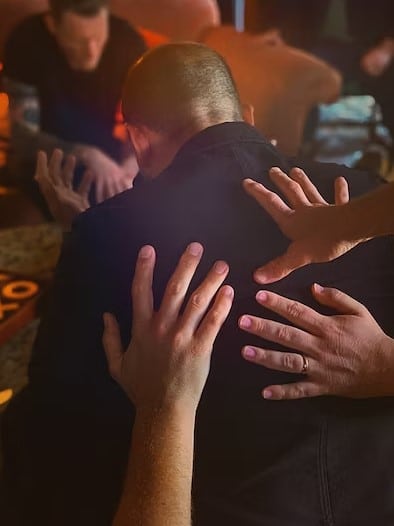“It is going to hurt a lot,” says counsellor Benny Bong, but marital recovery after an affair is possible
by Christine Leow // September 29, 2023, 2:26 pm

A marriage can recover from an affair but couples need to work through the three stages of recovery, said therapist and trainer Benny Bong. Photo by Shoeib Abolhassani on Unsplash.
There is no justification for an affair.
Once there is an affair, the vase (of trust) is broken.
You didn’t just cheat on me, you cheated on us.
Benny Bong started his webinar “Marital Recovery in the Face of Infidelity”, organised as part of the Singapore Bible College Counselling Week 2023, with these statements. Each, he said, “had some truth” and so reflected the challenge of dealing with infidelity.

“There is no justification for an affair,” said veteran counsellor Benny Bong at the “Marital Recovery in the Face of Infidelity” webinar. Photo courtesy of Singapore Bible College.
Benny is the director and principal consultant of The Family Therapist, a counselling and training agency. He has more than 30 years of experience as a therapist, trainer and consultant, and has worked with government and private institutions, as well as volunteer welfare organisations.
“Marital recovery must involve both parties.”
This second part of the report on the webinar looks at the steps it takes to help a marriage recover from infidelity. Part 1 covered the definition of and reasons for affairs.
“The reasons cited places the problem of the affair squarely with the infidel,” noted Benny. “But marital recovery must involve both parties.”
The 3 stages of recovery
Benny likened a marriage after an affair to a ship that had “struck some rocks and is taking water in and sinking”. He outlined three stages of recovery:
- In the first stage, whatever hole that had developed as a result of the affair has to be closed so that no more water can come in.
- Once the hole has been plugged, the water needs to be bailed out or the ship would become unstable. “The water I am referring to here is the water of emotions of anger, disappointments, suspicion, sadness. All that needs to be addressed, to be cleared.”
- Finally, as the ship becomes more stable, it needs to sail to safer waters where there are fewer treacherous rocks.
For a marriage to recover after an affair, all three stages are necessary. “Some couples try to set sail to safer waters but their marriage is still taking in water,” he said.
“Or some couples get stuck at stage 2 where it’s all about the sadness, the suspicion. They don’t know what to do with it.”
Stage 1: Plug the hole
- End the affair
“When couples want to come together or work on the relationship, the affair must stop immediately or as soon as possible,” said Benny.
Some agree to end the affair only to placate their spouse, and not because they want to. When that is the case, they tend to resume the affair – which leads to another discovery and another disruption.
“The affair must stop immediately or as soon as possible.”
“It’s important to hear out what are some reasons why that affair cannot be stopped immediately.”
If the affair cannot end immediately, then set a timeframe within which it needs to end.
Once that is done, limits to contact must be set.
Sometimes ceasing all contact is not possible because, for example, they work in the same office and getting a new job is not feasible. So, the couple needs to discuss the types of contact that should be omitted.
“If it’s about work, then that is the only contact possible,” Benny suggested. “No lunches together, no drives together alone with each other, no more contact on the phone.
“So we are very clear if the parties want to work on the relationship, that needs to happen.”
- Communicate the decision
How the decision to end the affair is communicated is a very important part of plugging the hole in the marriage. Some parties may insist on being present when the spouse ends the affair.
“They may say, ‘When he announces his decision, I want him to take personal responsibility for it.
“ ‘I don’t want him to fudge. I don’t even want it to come across in a manner that says, you know, my wife knows so I cannot see you because she’s very upset.’ ”
- Build confidence
Benny stated: “Trust is really the main element we are looking at at this first stage of not creating more vulnerability.”
Transparency and accountability help to build trust. Some issues to consider: “Are there things that you would like to know, to keep track of? How willing are the parties to open up their lives to be more comfortable with each other?”
Setting boundaries that ring-fence the marriage is another confidence-building step.
“Protect the relationship so that there is no new violation of boundaries in the relationship,” Benny said. “So, perhaps changing telephone numbers, blocking messages.”
“Protect the relationship so that there is no new violation of boundaries in the relationship.”
Sometimes, the boundaries are breached not by the spouse but by the third party. There needs to be a conversation about how to deal with such breaches.
“Maybe you got a message and you open it up and it says, ‘Oh, I just remembered it is your birthday and I wanted to wish you happy birthday.’ So, what happens and what should happen when contact is made?”
The hurting spouse should be asked if he or she wants to know when contact initiated by the other party happens. Most of the time, the spouse wants to know. How the spouse reacts to these unsolicited contacts needs to be managed.

What should happen when contact by the third party is made? Benny Bong urged open conversation about such issues. Photo by Christian Wiediger on unsplash.com.
“We also want to make sure that that eruption, that reaction is not going to be so overblown that it again jeopardises the marriage.”
The spouse who strayed needs to reduce reminders and stop obsessions – in other words, get rid of anything that triggers memories of the affair.
“Even as you stop having new contact with your partner, it also means that the old contact is not to be savoured over, remembered. All ruminations of that relationship should not be allowed,” Benny warned.
In this, the hurt spouse also has a part to play. The pursuit of evidence of and information about the affair may actually trigger the infidel.
“The old contact is not to be savoured over. All ruminations of that relationship should not be allowed.”
“The spouse needs to work on: ‘When I become reminded of the affair, how do I deal with my emotions?’
“Because sometimes those emotions can be so destructive it can lead this individual to go and find new ways of hurting the infidels. And that again adds to the instability of the relationship.”
Being discriminate about sharing about the affair to others is important, too. The confidante needs to be someone with values that will help stabilise the marriage.
“Trust is such a difficult thing to nurture. It’s not something that’s on demand. It’s a process.”
The transparency and accountability of the infidel helps. But there is also the issue of the paradox of trust.
Benny cautioned that badgering the infidel every night for hours about the affair will not help the marital recovery process. “There needs to come a point where it’s no longer about good reasons to trust him or her.
“I can keep asking new demands. But at the end of the day, adding more items isn’t going to build your trust.
“At some point, you have to say, ‘I’m going to learn how to trust. As long as that individual has been consistent with showing that he’s accountable, is transparent and is honest about his intent, then I can begin to trust.’ ”
The hurt spouse needs to be aware of unresolved past issues that can affect trust, for example: “ ‘I remember he said those things, I remember he’s done those things. I’ve asked for his phone. Yes, he surrendered his phone, but not the password. I discovered he had a second phone.’
“Past experiences may complicate this process of trusting one’s spouse again.”
Stage 2: Bail out the water
In stage 2, the “water” – which is the range of emotions such as hurt, anger, suspicion, anxiety, sadness and loss – needs to be released.
“This may represent, for many couples, the most difficult stage in their marital recovery because this involves the releasing of those emotions before there can be some stability in the relationship.
Deeper forgiveness requires knowing what is being forgiven.
“The releasing of emotions also allows for personal relief from some of these very difficult feelings involved. Addressing these emotions can lead to authentic regret and a deeper level of forgiveness.”
Deeper forgiveness requires knowing what is being forgiven, he asserted. “This may relate to the fact that ‘I know some things that he has done. There are a lot of other things that I don’t know that he refuses to talk to me about.
“ ‘And yet at the same time he expects a blanket forgiveness, even of the sins I’m not aware that he has committed.’
“So, in bailing out the water, it is really about saying, ‘Let me get to some of the issues that maybe I’m unaware of and be able to acknowledge them to let go.’ ”
This may come spontaneously at the discovery of the affair or it may take time, because the hurting spouse may withdraw if the information is overwhelming.

The hurting spouse may withdraw if the information on the affair is too overwhelming. Photo by Fa Barboza on unsplash.com.
In this stage, the hurting party needs to express the pain by being specific about the many hurts that have been experienced. This would include making an inventory, going through each item, acknowledging them and letting the hurts go.
“It is going to hurt a lot. Learn how to manage strong emotions because they will be there, how to self-regulate, how to self-soothe.
“There is a place for anger and there’s a way to express anger without it being too destructive.”
“It is going to hurt a lot. Learn how to manage strong emotions because they will be there.”
The infidel must learn to sit and listen to the pain without being critical, attacking the hurt party, invalidating those feelings or promising quick fixes.
The infidel may also need to find support to deal with the guilt and shame, because those are strong emotions.
All this is tough work which may be complicated by several things, including uncovering information that may not already be known about the affair. The hurting party may feel that unless and until all about the affair is known, forgiveness cannot begin because there are too may secrets.
But the infidel may be uncertain of what and how much to reveal.
Benny helps such couples by working on the idea of truth and reconciliation, which is contrary to the concept of truth and justice.
With truth and reconciliation, the truth is revealed only after reconciliation is promised. “Before we even open it up, you say, ‘No matter what we discover, we have already decided that we are going to work at marital recovery.’
“So we only pick up those skeletons that are going to help us in our process of recovery, not to decide judgement.
“That’s asking a lot. I know this is a tough one and not many couples are ready for this,” Benny conceded.
At this stage, couples may choose to work individually with counsellors as well.
“There may be some individuals who are experiencing so much pain, especially the hurt party, almost driving them insane, that they need to work one-on-one on these issues.”
Such individual work needs to be aligned to the work being done as a couple.
This is also the stage when the larger relationship within the family and stresses put on the family may surface.
Stage 3: Sail to safer waters
In the last stage, matters in the marriage that should have been attended to but were left to fester – thus generating negative feelings and contributing to climate-setting for the affair – need to be addressed so rebuilding and restoration can take place.
Infidelity can cause cracks in a marriage but the marriage can be put together again.
- Couples need to begin by re-visioning the kind of marriage they want. Infidelity can cause cracks in a marriage but the marriage can be put together again, said Benny.
“Maybe those cracks can be part of the beauty of the past. Maybe we cannot forget those things that happened but we can remember it in a different way.”
- There may be a need for restoration of various aspects of the marriage. This may include restoration of trust.
“The parties may decide, ‘Look, I don’t need you to keep coming back and giving me a report of where you had gone and to be accountable.’ ”
Restoration can also mean restoration of relationships with extended family or even friends.
“ ‘Maybe when things were not well with us, I was very angry and I told you to not associate with friends. And now I’m willing to let go of that. I think those friends are good friends.’ ”
- Finally, couples can institute rituals. This can be a renewal of vows or going back to the site of the first honeymoon as a symbol of renewal.
Moving forward
The work of marital recovery can take between two to four years.
Those around who want to help the couple can encourage them to pursue reconciliation instead of making rash decisions when strong emotions are involved.

The church community can support a recovering marriage by providing a listening ear and prayer. Photo by Jon Tyson on unsplash.com.
A listening ear and support for the infidel and the children affected are helpful as well. Here is where the church community can step in.
“The issues need to be dealt with in the right order – past hurts, present concerns, then future plans.”
Another important factor is the sequencing of issues. Benny explained: “The issues need to be dealt with in the right order – dealing with past hurts, present concerns, then future plans.
“So, focusing first on the crisis of infidelity as a starting point before dealing with existing or pre-existing marital problems.”
Finally is the idea of neutrality and alignment that a counsellor must have when helping couples restore their marriage.
“Neutrality does not mean we do not see certain action as inappropriate, wrong, hurtful, irresponsible and usually doesn’t mean that we are so accepting of those actions that we make no comment.
“Accepting of the individual position is to say, ‘We want to work towards marital recovery and we can be accepting of this. But we can call out certain behaviours that are inappropriate.’ ”
Click here for Part 1 of the coverage of the webinar, “Marital Recovery in the Face of Infidelity”.
RELATED STORIES:
Trapped in a string of unhealthy and abusive relationships, this single mother finally broke free
Who cares for the caregivers? 70-year-old Auntie Audrey does
We are an independent, non-profit organisation that relies on the generosity of our readers, such as yourself, to continue serving the kingdom. Every dollar donated goes directly back into our editorial coverage.
Would you consider partnering with us in our kingdom work by supporting us financially, either as a one-off donation, or a recurring pledge?
Support Salt&Light


